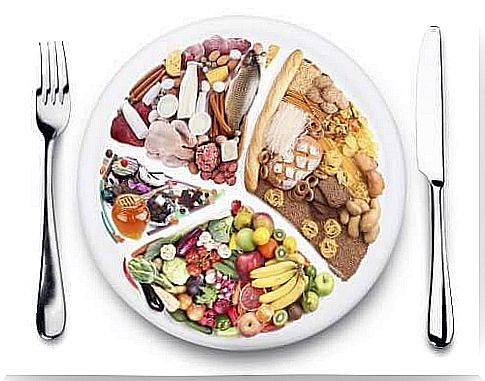Prevent Digestive Disorders With 9 Healthy Habits

Digestive disorders are quite common: intestinal gas. constipation, acidity, heaviness and others can bother us in different situations. People often think that eating healthily is enough to prevent them, but there are actually many other factors that affect stomach health. Let’s see in the next lines how to prevent digestive disorders.
The truth is that these ailments not only bother us, but they make us live really difficult times. In the long run, they can even get complicated and cause more serious health problems than just annoyance.
Often, however, a few simple changes in diet and lifestyle in general are enough to keep stomach pain at bay and prevent digestive upset .
9 healthy habits to prevent digestive disorders
1. Maintain proper hydration

The famous 8 glasses of water a day, or 2 liters, are essential for stomach health. Numerous studies have shown that water prevents constipation. In fact, the intestine needs liquids to carry food along its intricate path.
Furthermore, water facilitates the breakdown of food and the absorption of nutrients. The absence of liquids causes us to lose much of the nutrients provided by food.
We can hydrate ourselves, however, in other ways as well. In fact, water is also present in foods such as fruit and vegetables, so we can take it through juices, soups and infusions. Avoid sodas and sodas containing caffeine.
2. Eat only what is needed
Eating more does not mean eating better. Too much food causes heaviness, indigestion, and many other problems.
When too much food is consumed, the body is forced to work harder to process excesses. As a result, it produces more enzymes to break down food, resulting in an increase in stomach acids that cause gastroesophageal reflux.
Eating to excess also produces intestinal gas and speeds up metabolism, causing fatigue, sweating and a feeling of heat.
3. Balance meals to prevent digestive disorders

Meals should consist of healthy vegetables, proteins and carbohydrates. Experts recommend minimizing fat intake. Regarding protein, it is recommended to consume lean meats such as turkey, chicken and rabbit.
Industrial foods typically contain trans fats, which are related to cardiovascular and gastric problems, such as ulcers, colitis, and digestive irritation.
These foods are also rich in additives which, according to some studies, cause increased intestinal permeability, which can lead to intestinal inflammation, headaches and food allergies.
On the other hand, omega 3 fatty acids are extremely beneficial for stomach health. On the one hand, they help to calm hunger by reducing the need to overeat; on the other, they facilitate the absorption of nutrients. Some studies suggest that fatty acids prevent inflammation and intestinal ulcers.
4. Consume fiber
Foods rich in fiber offer numerous benefits for intestinal health by promoting proper digestion. Fiber helps cleanse the digestive system and gives more volume to stool, which is why they help fight constipation. For this reason it is recommended to consume dried fruit, legumes, vegetables, cereals and fruit.
5. Manage stress

The digestive system and the brain are connected by more than 100 million nerve cells, which transmit information in both directions. This is why we feel “butterflies” and tickling in the stomach in the face of certain emotional stimuli.
Stress affects stomach health, as evidenced by numerous studies that associate it with ailments such as diarrhea, constipation, acidity and gastritis. Implementing some stress management techniques, such as meditation, yoga, or exercise, promotes mental health and, therefore, digestive health as well.
6. Take time to eat and eat slowly
It is necessary to dedicate the right time to meals. Distractions like watching television or working cause stress. Eating quickly, on the other hand, promotes the production of gas and indigestion. Some studies show that paying due attention at mealtimes promotes better digestion and better intestinal health.
Taking the right amount of time to chew is also helpful in preventing digestive disorders. Digestion begins with the chewing of food. Cutting and grinding food properly with your teeth facilitates the work of digestive enzymes.
Chewing well also increases saliva production, which helps break down carbohydrates and fats and hydrates solids to move more easily through the digestive tract. It is therefore important to pay due attention to this first phase, in order to facilitate the digestion of food.
7. Consume food consciously

Foods can have different effects depending on the person. Some suffer from intolerances or allergies to specific foods and experience more problems when digesting them. Keeping the daily count of foods consumed helps to understand which foods are tolerated better and which can cause discomfort.
8. Play sports to prevent digestive disorders
Exercise has been shown to promote digestive health. It reduces the passage of food in the digestive system by 30%, increasing the absorption of nutrients. It also counteracts constipation and intestinal inflammation.
9. Avoid the vices

Bad habits such as smoking and drinking alcohol cause numerous digestive disorders. Tobacco increases the chances of suffering from heartburn, ulcers and, in the worst case, stomach cancer.
On the other hand, alcohol increases acidity, gastroesophageal reflux and promotes the proliferation of bacteria, causing inflammatory bowel disease.
Say goodbye to digestive disorders
It is not at all difficult to improve digestive health and avoid discomfort after meals. Simple changes in diet and daily habits may be more than enough. The benefits won’t be limited to just eliminating digestive disorders.
As medical evidence shows, a healthy digestive system equals a healthy body in general. These 9 habits will make you feel better in every sense.









